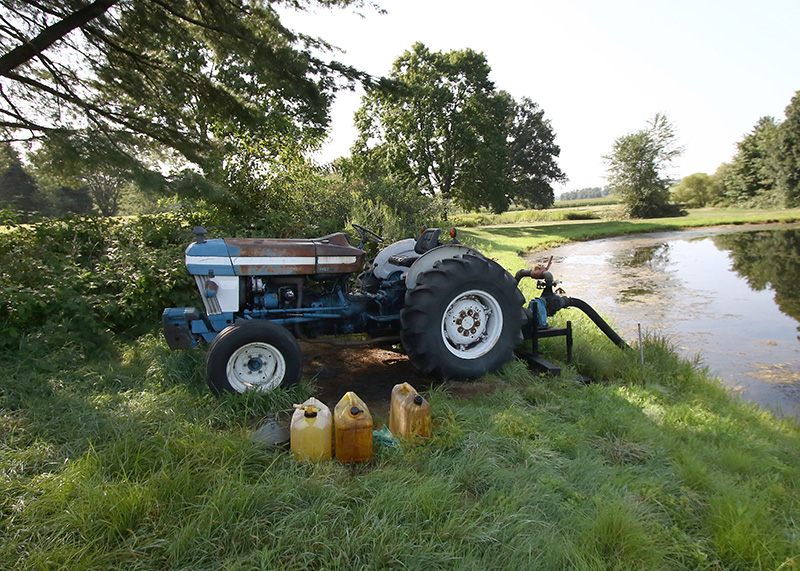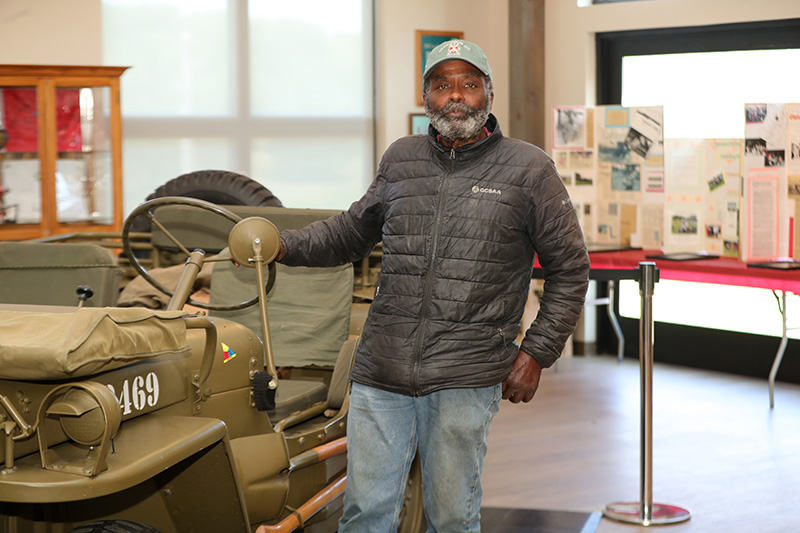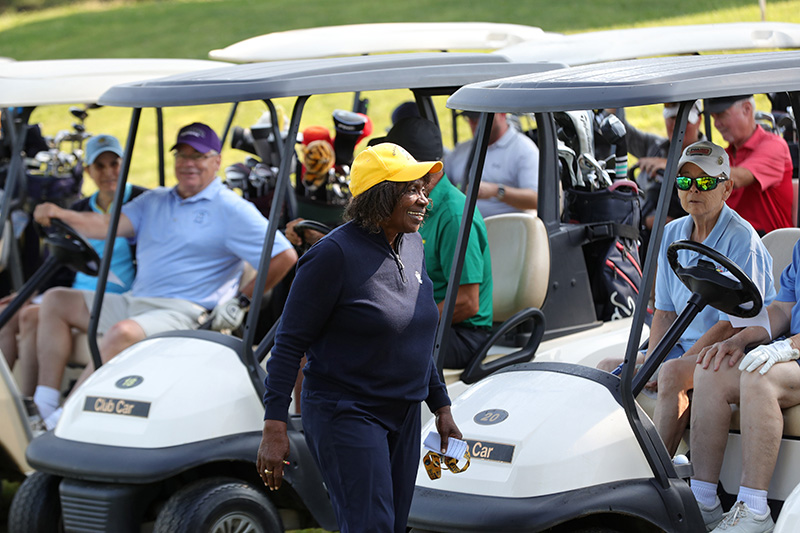
The current irrigation system at Clearview Golf Club. Photos by Ed Hall Jr.
The “irrigation system” at Clearview Golf Club in East Canton, Ohio, isn’t much to look at, but longtime superintendent Larry Powell remembers when it was even worse.
“It’s been different,” says Powell, a 50-year member of GCSAA who grew up on the historic course his father, Bill, built. “I remember dad started out with a barrel to get water on the greens.”
Compared to that, Larry Powell’s method — a pump attached to the power take-off shaft of an old Ford tractor that moves the water from an on-course pond, through above-ground hoses, to sprinklers on the green — is quite efficient. Tees and fairways, however, only get water from above: rain.
And it has been a dry year.
“We’re brown,” says Larry Powell, an integral part of Clearview and the Powell family who, in 2019, received GCSAA’s Old Tom Morris Award. “It’s toast. Everything’s brown, except where we put water on the greens. We’re just waiting for God’s water.”
With a little bit of good fortune, not to mention a few hundred thousand dollars, that could be about to change. The Clearview Legacy Foundation, a 501(c)(3) tax-exempt charitable foundation established in 2001 to enhance educational programming and preservation of the first (and still only) golf course in the United States to have been designed, built, owned and operated by a Black American, is nearly halfway to its goal of raising $1.5 million to install a modern irrigation system.

Larry Powell, the current superintendent at Clearview Golf Club and a 50-year member of GCSAA.
In Powell’s mind, it’s not just about keeping the course — which in 2001 was placed on the National Register of Historic Places by the U.S. Department of the Interior — green.
“As a nonprofit public charity, we try to maximize what we can do in service of our mission statement,” says Larry Powell, superintendent at Clearview since 1971. “Part of that mission is education, teaching different types of golfers — veterans, children developing their game, elderly people, lessons for amputees. We have a broad spectrum of what we’re trying to do for our educational programs.
“And part of our mission statement is to preserve. We’re one of the few golf courses on the historic registry, one of only 13 courses on that list. Without water, it makes it difficult to meet those missions.”
After serving in World War II, Bill Powell returned to the United States to find the game of golf — which he practiced during his service overseas — was largely closed to him because he was Black. Despite his veteran status, he was denied a GI Bill loan. With financial help from his brother, Berry, who took out a second mortgage on his home, and two Black doctors, Bill Powell purchased a run-down dairy farm in 1946 and, before working second shift at the Timken Co. bearings plant, would labor to transform the property by hand into a nine-hole golf course that opened in 1948.
Bill Powell, a 37-year GCSAA member who died in 2009, carved out the second nine holes in 1978. From the start, the course has been open to all. As Bill Powell put it, he built the course to “allow anyone who wanted to play golf the opportunity to do so and feel welcome … and put the ‘fair’ back in fairway.”
Mark Jordan, CGCS, natural resource leader at Westfield Country Club in Westfield Center, Ohio, and 38-year GCSAA member, first crossed paths with Bill Powell in the early 2000s. In 2007, then president of the Ohio Turfgrass Foundation, Jordan toured the course with its creator.
“(Bill Powell) gave me blow-by-blow commentary on many locations throughout the course,” says Jordan, GCSAA’s president in 2021. “One of the most inspirational stops we made was on top of the No. 16 green, one of the highest elevations on the golf course. Looking to the south of the property, he said, ‘This is where I got the name. Look out there, over the countryside. It’s a clear view.’ That’s when it dawned on me, this guy really did have a vision.”

Renee Powell speaks with participants at the William Powell Celebrity Golf Tournament on Aug. 24 at Clearview Golf Club.
That’s why Jordan participated — again — in the William Powell Celebrity Golf Tournament at Clearview on Aug. 24, a fundraiser for the Clearview Legacy Foundation. Renee Powell — Larry’s sister and the course’s PGA Professional who was the second Black woman to play on the LPGA Tour — was among the former professional athletes who participated.
“This is a pretty inspirational place,” Jordan says. “It’s such a compelling story — the history and the perseverance. And it’s not just Bill. It’s the whole family, Bill and Larry and Renee. This story has to be told. I love Renee and Larry. They’re unsung heroes, working behind the scenes to carry on their mother and father’s legacy. I’m just trying to support them any way I can.”
Funds from the event go to all the foundation’s programs, but the irrigation system remains a priority because of its ability to touch them all.
“An irrigation system would be a tremendous help for all our programs,” Larry Powell says. “All the other courses around here have irrigated fairways. We don’t. People say, ‘We’ll go down south’ when they see all the green grass down there. It definitely affects you, for sure.”
Andrew Hartsock is GCM’s editor-in-chief.